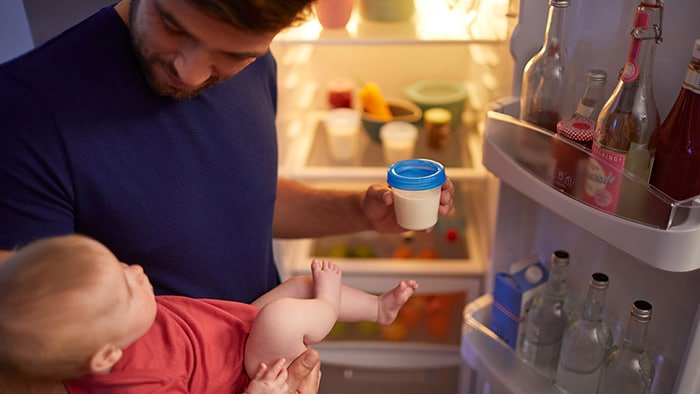March 2021
Partner support affects breastfeeding

Depending on the type of support given, partners of new mothers can help to increase the length of time she breastfeeds. Responsiveness is key.
The longer a mother breastfeeds her baby, the better. The majority of new moms start off breastfeeding, but as weeks turn into months, the tendency is to slow down and stop. Research done in Australia shows that by a baby's 3rd month, exclusive breastfeeding rates have dropped from 90.4% to 39.2%. And in the UK, by a baby's 6th month, only 1% of moms are still breastfeeding exclusively.
Beyond the support of friends and family, mothers also need their partner's support, whether that person's a man or a woman, or if they are married, living together or apart. Now research has discovered that the type of support offered - and the attitude of partner when offering support - can make the difference between stopping and continuing breastfeeding.
Affecting breastfeeding duration
To find concrete answers, researchers looked closely at 8 studies based in Australia, Canada, Sweden and the UK. Their report, Partner behaviours improving breastfeeding outcomes: an integrative review, reveals interesting insights into the best way partners can support breastfeeding mothers.
Researchers looked at different types of support, and how they affected the length of time a mother breastfeeds her baby. The elements that make up support were: knowledge, help, encouragement and responsiveness.
Types of support
Knowledge was defined as "learning and applying breastfeeding knowledge, including the ability to 'troubleshoot' breastfeeding problems." Some studies showed an increase in the length of breastfeeding when the partner applied knowledge. But another study showed that knowledge could actually decrease the duration of breastfeeding.
Help means to offer "tangible, practical help, including household chores, care of baby/other children/mother, and practical help during breastfeeding sessions." Helping, however, offered conflicting results. It increased breastfeeding duration early on - but rates of breastfeeding decreased after 9-12 months. Other studies showed that help actually reduced breastfeeding duration. By adding responsiveness to the mix, and the duration of breastfeeding increased.
Researchers defined encouragement as "showing appreciation of the women and the fact that she is breastfeeding and expressing a wish for her to continue breastfeeding." Help and encouragement were good ways to get a mom to start breastfeeding. But when it comes to duration, encouragement only managed to increase the duration of breastfeeding when coupled with responsiveness.
Responsiveness - which turns out to be essential - refers to "sensitivity to the women's needs, respect for her decisions, promoting self-autonomy/efficacy, co-parenting and providing knowledge/help/encouragement in a manner acceptable to the woman." The duration of breastfeeding increases when responsiveness is involved.
Responsiveness is key
In fact, 5 of the 8 studies reviewed showed an increase in breastfeeding duration when partners "provided help, knowledge, or encouragement in a manner that was sensitive to the mother's needs." Without responsiveness, breastfeeding duration tended to decrease. Some studies even showed that partners who provide more help tended to lead to moms stopping breastfeeding. And the more the partner showed off their knowledge, help and encouragement, the shorter the mom breastfed.
According to this review, it's all about attitude and teamwork - with mom being central to the breastfeeding journey. She gains the most benefit from a partner who knows about breastfeeding, is encouraging and can help out - without instructing her about what she should be doing. Or making her feel as though she is incapable of taking care of herself and her household.
Being sensitive to mom's needs, responding to them appropriately, and showing respect is the type of support that tends to pay off in the end. Midwives and other healthcare professionals can set the right tone by promoting co-parenting techniques that include effective communication, collaborative problem-solving and conflict resolution.
40 years of father in the obstetrical – helpful or rather counterproductive? by Prof. Dr. med. Michael Abou-Dakn, St. Joseph Hospital, Berlin
Share this article:
Related Articles
Not a Healthcare Professional?
Literatur Eirwyn L. Davison, Richard L. Ollerton, Partner behaviours improving breastfeeding outcomes: an integrative review, Women and Birth 33 (2020) e15-e23



